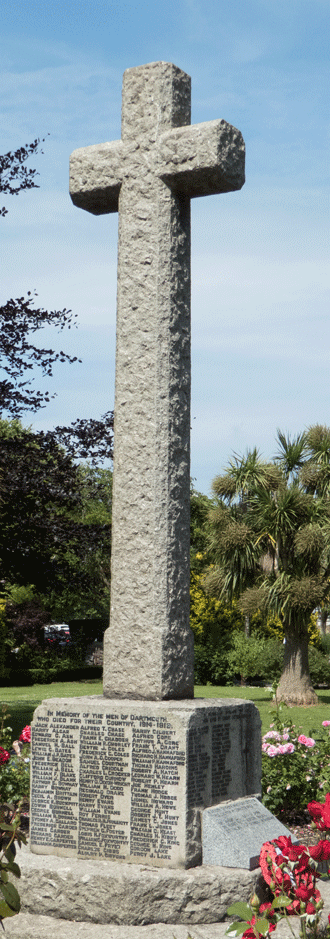Frank Edwin Chadder
Frank Edwin Chadder was born in Dartmouth on 4 February 1900 and baptised on 13 March at St Petrox. He was the youngest child of William James Prowse Chadder and his wife Robina (sometimes spelt Rubina) Barter. William was born in Chillington, but had moved to Dartmouth with his family by the time of the 1881 Census. When he married Robina in 1893, he was living in Warfleet and worked as a labourer. Robina came from Stoke Fleming.
William and Robina's first child, William John Henry (named for his father and grandfather) was baptised on 20 March 1894 at St Petrox. By then they were living in the Newcomen Road, and William had obtained work as a wagon driver. A daughter, Beatrice Louisa, followed, also baptised at St Petrox, on 4 September 1895.
At the time of the 1901 Census, the family lived in Brewery Cottages, Warfleet and William's occupation was described as "Grocer's wagoner". The Brewery and much associated property at Warfleet was owned by Jasper Bartlett, who ran a grocery store called the "Borough Supply Stores" on New Quay which, amongst much else, sold his own pale ales, manufactured at Warfleet:
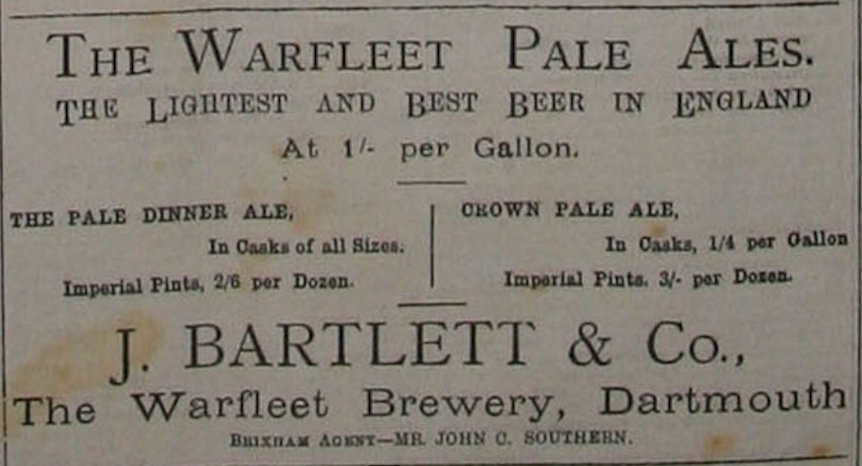
William worked for Bartlett's for many years, eventually moving from a horse-drawn waggon to a motorised van. The family lived at "The Bower" in Warfleet.
In 1910, William John Henry, Frank's elder brother, joined the Royal Navy, as a Boy 2nd Class, and signed on for 12 years service in 1912. At the outbreak of war in August 1914 he was serving in HMS Squirrel, a coastguard vessel, based at Devonport. Frank was only 14, and his parents probably hoped he would escape any call to serve - but it was not to be.
Service
Like so many men, Frank's Army service record has not survived and there are few other records relating to him apart from those concerning his death. What follows therefore has been inferred from his date of birth and from the recruitment and training arrangements in place at the relevant period.
Conscription had been introduced in January 1916 and in May of that year liability for military service was extended to all men aged 18 to 41, single and married, although no-one was to be sent abroad until he had reached the age of 19. In January 1917, in response to the need for men, the minimum age for conscription was lowered from 18 years 7 months to 18.
After conscription was introduced, arrangements for training were reorganised - infantry regiments no longer recruited locally. Reserve battalions instead formed part of a single Training Reserve. Further reorganisation in 1917 created "Young Soldiers" battalions, which provided four months training for those assessed as likely to be fit for general service abroad once they reached the right age; and "Junior Training Reserve" battalions which provided six months training for recruits likely to be in lower medical categories. Those under 19 when they completed their training were then sent to "Graduated" battalions for further training, until they were old enough to be drafted - this might also involve more specialist training, depending on their suitability.
In a further change in October 1917, "Young Soldiers" and "Graduated" battalions were given regimental affiliations, the idea being that those brought first into a "Young Soldiers" battalion in a regiment would then transfer to the "Graduated" battalion in the same regiment.
Frank turned 18 on 4 February 1918, when he would have been "deemed to have been enlisted", in the language of conscription. He would have been called up soon afterwards to begin his training, presumably to the Devonshire Regiment as it was with this Regiment that he was serving by the time of his death. Although the manpower crisis provoked by the impact of the German spring offensive in late March 1918 caused the authorities to break the under-19 rule, and send out soldiers to the front aged 18½ who had completed their training, Frank's name does not figure on the Devonshire Regiment medal roll (or indeed any other regimental medal roll), suggesting that he did not serve in an operational theatre before 11 November 1918. It seems likely therefore that he remained in the UK with the 51st Graduated Battalion Devonshire Regiment, based in Norfolk, until the end of the fighting.
Army of Occupation: British Army of the Rhine
The Armistice on 11 November 1918 laid down a schedule for the withdrawal of German troops and provided for British, French and American troops to occupy Germany west of the Rhine. A series of bridgeheads was established eastwards across the Rhine river - the British around Cologne, the Americans around Coblenz, and the French between Mainz and Frankfurt.
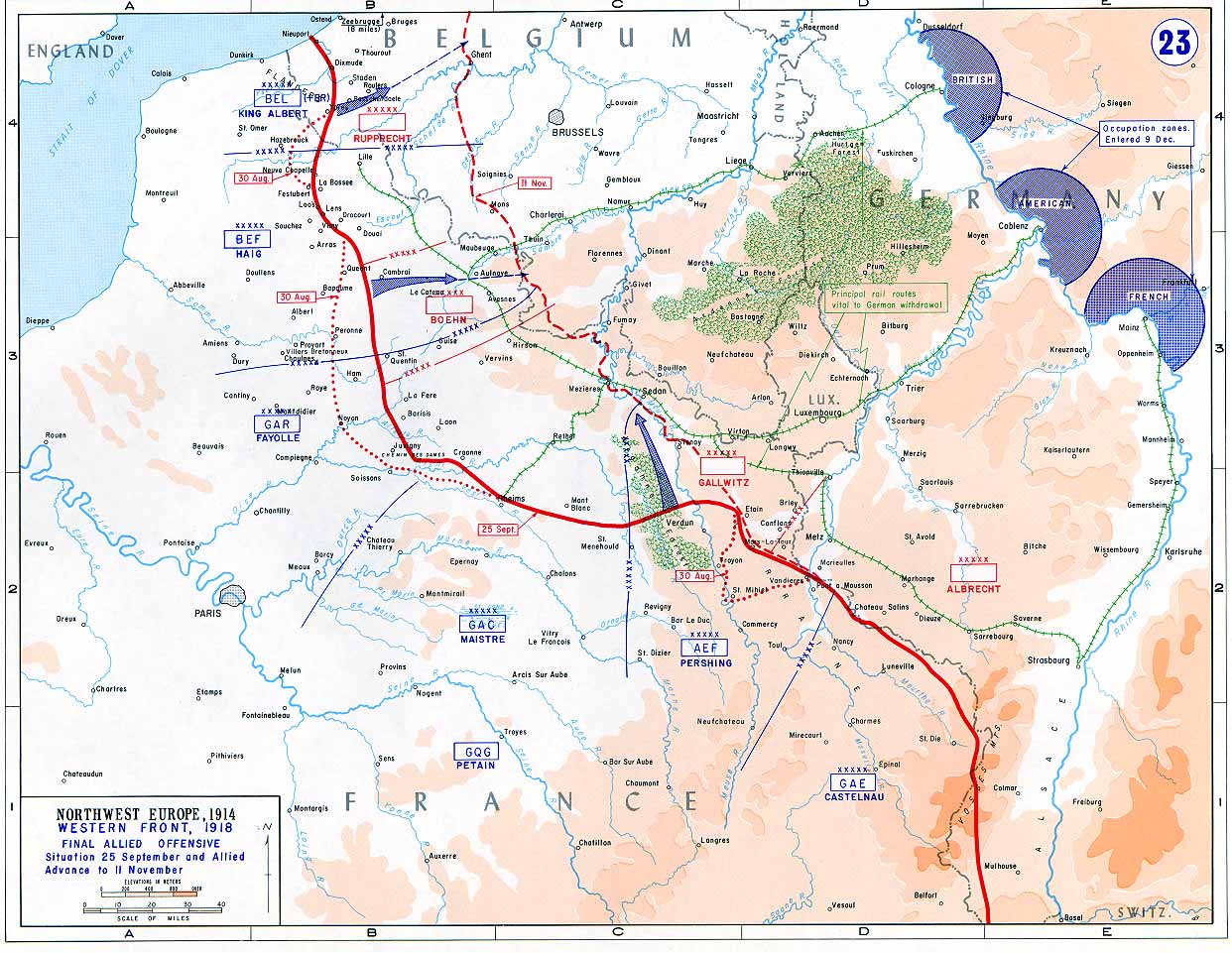
The British Army entered German territory on 3 December 1918, reached the Rhine by 9 December and four days later had taken control of their zone of occupation, including the city of Cologne itself and the bridgehead which extended approximately ten miles east. Occupied areas were subject to martial law, but local civilian authorities continued in office under military oversight, so far as possible, with minimal interference.
In January 1919 Winston Churchill, who had taken over as Minister for War, faced the challenge of achieving demobilisation of those who had fought during the war as quickly as possible, whilst also meeting the continuing need for military manpower. He decided to create a new army of around 900,000 men, mostly from younger age groups conscripted at the end of the war but who had finished basic training too late to go to the front. These inexperienced men would be strengthened with specialist units and experienced NCOs retained from the wartime Second Army. So, although conscription as such ceased on 11 November 1918, Frank was not amongst those able to leave the Army.
From March 1919, British troops in the British occupation zone formed the (first) British Army of the Rhine (BAOR). The new army initially had five corps, each of two divisions, and a cavalry division. Southern Division, in II corps, was formed from the old 29th Division and included three infantry brigades; in 87th Infantry Brigade, 51st and 52nd Battalions Devonshire Regiment (as they were now called) joined in March, three regular battalions left in April 1919 to go home, and 1/5th Battalion Devonshire Regiment joined in May.
On 21 March 1919 the Western Times reported:
Devon Young Soldiers Overseas:
It is understood that the 51st and 52nd Battalions of the Devon Regiment have left England for the Continent. These battalions were originally known as the graduated "Young Soldiers' Battalions", which were formed for the training of recruits called to the colours before they were old enough to be sent in draft overseas during the period of the war. The 53rd Battalion is awaiting orders to follow.
The War Diary of 51st Devons begins with their arrival by train in Mulheim, near Cologne, on 12 March 1919, after crossing the Channel to Dunkirk. Three days later they marched to Burscheid where their numbers were reinforced by a large draft from the 53rd Devons. Their role was to ensure peace and stability in the occupied area "in the event of a rising or serious disturbance on the part of the civilian population" and to hold the "perimeter" securely. In practice, however, there were no risings, and minimal disturbance. On a day to day basis, time was largely spent training and in sport, parades and entertainment.
However, in these early months of 1919 there was fear that peace negotiations might yet break down and even that hostilities might resume. In that event the Allied occupation armies were to advance immediately further into Germany. When in mid-June Germany at first refused to sign the peace agreement, the 51st Devons marched to Solingen from their base at Hilgen, receiving orders to be ready imminently for "J day" - the date the Armistice would end and hostilities begin. But the moment of tension was brief - on 23 June 1919, whilst the battalion was in Solingen, news was received that the Peace Terms had been accepted. The Versailles Treaty was signed on 28 June. Preparations for hostilities were stood down and three days later, the battalion moved back to Hilgen. On 22 July 1918, the Battalion was selected to represent BAOR at the Belgian peace celebrations in Brussels.
With peace now finally secure the atmosphere relaxed once more and days were once again filled with cricket, boxing matches, concert parties, shooting competitions and gymkhanas. BAOR began to contract, four of the five divisions closing down by the end of August and the remaining division in November; they were replaced by a single "Independent Division" into the early months of 1920.
Death
The surviving War Diary of the 51st Devons ends on 31 October 1919 with the Battalion still serving in Germany. The 52nd Devons remained there to form part of the Independent Division for the next few months but the 51st Devons returned to the UK and were disbanded early in 1920. All remaining conscripts in the British Army were discharged on 31 March 1920.
Army records for Frank are few: a surviving pension index card records "Died, accident" on 13 November 1919 and the Army Register of Soldiers Effects records his death on that date in "hospital, Germany" but gives no detail of the cause. The CWGC cemetery register states that he "died of accidental injuries".
A short report in the Western Morning News of 21 November 1919 provides a little more information:
Mr and Mrs W Chadder, Warfleet, have been notified of the death of their son Pte F E Chadder, Devon Regt, on Nov 13, at No 55 Casualty Clearing Station, Germany [sic], from compound fracture of the leg, sustained in a railway accident. Deceased, who was 19 years of age, was returning from furlough.
55 Casualty Clearing Station was in Charleroi, Belgium, not in Germany, and this is consistent with Frank's burial in Marcinelle Cemetery, Charleroi, which contains several burials of those who died in that Casualty Clearing Station whilst it was based in the hospital in Charleroi during 1919. It was disbanded shortly after Frank's death. Newspapers contain a number of reports of railway accidents involving demobilising British troops during 1919, including one in May 1919 in Charleroi in which seven soldiers were killed and "about a score were seriously injured", and another in Mons in October 1919 in which two soldiers were "seriously injured". But it has not so far been possible to establish the specific date or circumstances of the accident which caused Frank's death. There is no mention of any such accident in the 51st Devons' War Diary.
Frank is commemorated by an official war grave in Marcinelle New Communal Cemetery, Charleroi, Belgium. At his parents' request his headstone was engraved with the words: "Blessed are the dead which die in the Lord".
In Dartmouth he is commemorated on the Town War Memorial and on the St Petrox War Memorial, where his name was included in a panel headed "Died from wounds, disease".
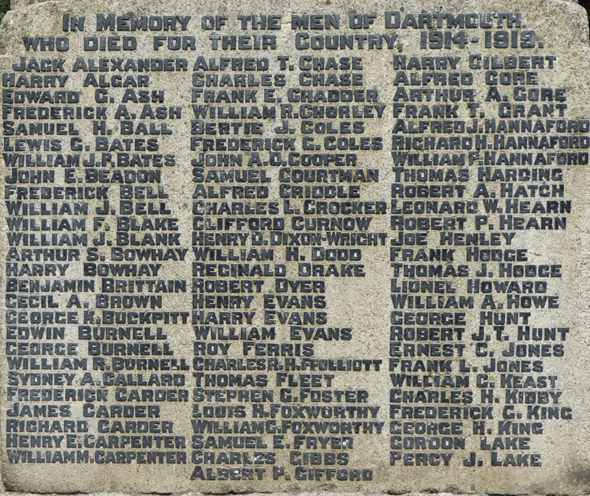
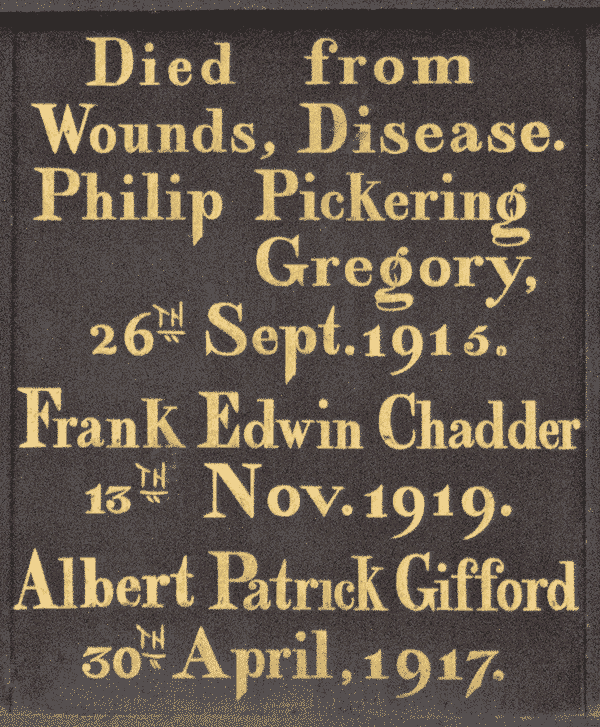
Sources
War Diary of 51 Battalion Devonshire Regiment 1 March 1919 - 31 October 1919 WO 95/2305/4, available at the National Archives, fee payable for download.
The Devonshire Regiment 1914-1918, compiled by C T Atkinson, Exeter and London 1926
The Original British Army of the Rhine, Richard A Rinaldi, 2006
The British in Interwar Germany: The Reluctant Occupiers, 1918-1930, David G Williamson, Bloomsbury, London, 2nd Edition, 2017
Information Held on Database
| Surname: | Chadder |
| Forenames: | Frank Edwin |
| Rank: | Private |
| Service Number: | 73115 |
| Military Unit: | 51 Bn Devonshire Regiment |
| Date of Death: | 13 Nov 1919 |
| Age at Death: | 19 |
| Cause of Death: | Died following railway accident |
| Action Resulting in Death: | |
| Place of Death: | Charleroi, Belgium |
| Place of Burial: | Marcinelle Cemetery, Belgium |
| Born or Lived in Dartmouth? | Yes |
| On Dartmouth War Memorial? | Yes |
| On St Saviour's Memorials? | No |
| On St Petrox Memorials? | Yes |
| On Flavel Church Memorials? | No |
| In Longcross Cemetery? | No |
| In St Clement's Churchyard? | No |
| On a Private Memorial? | No |
| On Another Memorial? | No |















